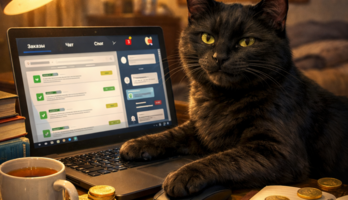flynn_gillian_gone_girl (1) (858987), страница 18
Текст из файла (страница 18)
He doesn’t talk to me, hebehaves as if the act of talking physically pains him and I am a vicious woman to ask itof him.He barely shrugs when I tell him I was laid off. Last week.“That’s awful, I’m sorry,” he says. “At least you have your money to fall back on.”“We have the money. I liked my job, though.”He starts singing “You Can’t Always Get What You Want,” o -key, high-pitched, witha little stumbling dance, and I realize he is drunk. It is late afternoon, a beautiful blueblue day, and our house is dank, thick with the sweet smell of rotting Chinese food, thecurtains all drawn over, and I begin walking room to room to air it out, pulling back thedrapes, scaring the dust motes, and when I reach the darkened den, I stumble over a bagon the oor, and then another and another, like the cartoon cat who walks into a roomfull of mousetraps.
When I switch on the lights, I see dozens of shopping bags, and theyare from places laid-o people don’t go. They are the high-end men’s stores, the placesthat hand-tailor suits, where salespeople carry ties individually, draped over an arm, tomale shoppers nestled in leather armchairs. I mean, the shit is bespoke.“What is all this, Nick?”“For job interviews. If anyone ever starts hiring again.”“You needed so much?”“We do have the money.” He smiles at me grimly, his arms crossed.“Do you at least want to hang them up?” Several of the plastic coverings have beenchewed apart by Bleecker. A tiny mound of cat vomit lays near one three-thousanddollar suit; a tailored white shirt is covered in orange fur where the cat has napped.“Not really, nope,” he said.
He grins at me.I have never been a nag. I have always been rather proud of my un-nagginess. So itpisses me o , that Nick is forcing me to nag. I am willing to live with a certain amountof sloppiness, of laziness, of the lackadaisical life. I realize that I am more type-A thanNick, and I try to be careful not to in ict my neat-freaky, to-do-list nature on him. Nickis not the kind of guy who is going to think to vacuum or clean out the fridge. He trulydoesn’t see that kind of stu . Fine.
Really. But I do like a certain standard of living—Ithink it’s fair to say the garbage shouldn’t literally over ow, and the plates shouldn’t sitin the sink for a week with smears of bean burrito dried on them. That’s just being agood grown-up roommate. And Nick’s not doing anything anymore, so I have to nag,and it pisses me o : You are turning me into what I never have been and never wanted tobe, a nag, because you are not living up to your end of a very basic compact. Don’t do that, it’snot okay to do.I know, I know, I know that losing a job is incredibly stressful, and particularly for aman, they say it can be like a death in the family, and especially for a man like Nick,who has always worked, so I take a giant breath, roll my anger up into a red rubberball, and mentally kick it out into space.
“Well, do you mind if I hang these up? Just sothey stay nice for you?”“Knock yourself out.”His-and-her layo s, isn’t that sweet? I know we are luckier than most: I go onlineand check my trust fund whenever I get nervous. I never called it a trust fund beforeNick did; it’s actually not that grand. I mean, it’s nice, it’s great—$785,404 that I have insavings thanks to my parents. But it’s not the kind of money that allows you to stopworking forever, especially not in New York.
My parents’ whole point was to make mefeel secure enough so I didn’t need to make choices based on money—in schooling, incareer—but not so well-o that I could be tempted to check out. Nick makes fun, but Ithink it’s a great gesture for parents to make. (And appropriate, considering theyplagiarized my childhood for the books.)But I’m still feeling sick about the layoff, our layoffs, when my dad calls and asks if heand Mom can stop by. They need to talk with us. This afternoon, now, actually, if it’sokay. Of course it’s okay, I say, and in my head, I think, Cancer cancer cancer.My parents appear at the door, looking like they’ve put up an e ort. My father isthoroughly pressed and tucked and shined, impeccable except for the grooves beneathhis eyes.
My mother is in one of her bright purple dresses that she always wore tospeeches and ceremonies, back when she got those invitations. She says the colordemands confidence of the wearer.They look great, but they seem ashamed. I usher them to the sofa, and we all sitsilently for a second.“Kids, your mother and I, we seem to have—” my father nally starts, then stops tocough. He places his hands on his knees; his big knuckles pale. “Well, we seem to havegotten ourselves into a hell of a financial mess.”I don’t know what my reaction is supposed to be: shocked, consoling, disappointed?My parents have never confessed any troubles to me.
I don’t think they’ve had manytroubles.“The fact of the matter is, we’ve been irresponsible,” Marybeth continues. “We’vebeen living the past decade like we were making the same kind of money we did for theprevious two decades, and we weren’t. We haven’t made half that, but we were indenial. We were … optimistic may be a kind way to put it. We just kept thinking the nextAmy book would do the trick. But that hasn’t happened.
And we kept making baddecisions. We invested foolishly. We spent foolishly. And now.”“We’re basically broke,” Rand says. “Our house, as well as this house, it’s allunderwater.”I’d thought—assumed—they’d bought this house for us outright. I had no idea theywere making payments on it. I feel a sting of embarrassment that I am as sheltered asNick says.“Like I said, we made some serious judgment errors,” Marybeth says. “We shouldwrite a book: Amazing Amy and the Adjustable Rate Mortgage. We would unk every quiz.We’d be the cautionary tale. Amy’s friend, Wendy Want It Now.”“Harry Head in the Sand,” Rand adds.“So what happens next?” I ask.“That is entirely up to you,” my dad says.
My mom shes out a homemade pamphletfrom her purse and sets it on the table in front of us—bars and graphs and pie chartscreated on their home computer. It kills me to picture my parents squinting over theuser’s manual, trying to make their proposition look pretty for me.Marybeth starts the pitch: “We wanted to ask if we could borrow some money fromyour trust while we figure out what to do with the rest of our lives.”My parents sit in front of us like two eager college kids hoping for their rstinternship. My father’s knee jiggles until my mother places a gentle fingertip on it.“Well, the trust fund is your money, so of course you can borrow from it,” I say.
I justwant this to be over; the hopeful look on my parents’ faces, I can’t stand it. “How muchdo you think you need, to pay everything off and feel comfortable for a while?”My father looks at his shoes. My mother takes a deep breath. “Six hundred and ftythousand,” she says.“Oh.” It is all I can say. It is almost everything we have.“Amy, maybe you and I should discuss—” Nick begins.“No, no, we can do this,” I say. “I’ll just go grab my checkbook.”“Actually,” Marybeth says, “if you could wire it to our account tomorrow, that wouldbe best. Otherwise there’s a ten-day waiting period.”That’s when I know they are in serious trouble.NICK DUNNETWO DAYS GONEI woke up on the pullout couch in the Elliotts’ suite, exhausted.
They’d insisted I stayover—my home had not yet been reopened to me—insisted with the same urgency theyonce applied to snapping up the check at dinner: hospitality as ferocious force ofnature. You must let us do this for you. So I did. I spent the night listening to their snoresthrough the bedroom door, one steady and deep—a hearty lumberjack of a snore—theother gaspy and arrhythmic, as if the sleeper were dreaming of drowning.I could always turn myself o like a light.
I’m going to sleep, I’d say, my hands inprayer position against my cheek, Zzzzzz, the deep sleep of a NyQuiled child—while myinsomniac wife fussed in bed next to me. Last night, though, I felt like Amy, my brainstill going, my body on edge. I was, most of the time, a man who was literallycomfortable in his own skin. Amy and I would sit on the couch to watch TV, and I’d turnto melted wax, my wife twitching and shifting constantly next to me.
I asked her once ifshe might have restless leg syndrome—an ad for the disease was running, the actors’faces all furrowed in distress as they shook their calves and rubbed their thighs—andAmy said, I have restless everything syndrome.I watched the ceiling of the hotel room turn gray then pink then yellow and nallypulled myself up to see the sun blaring right at me, across the river, again, a solar thirddegree. Then the names popped in my head—bing! Hilary Handy.
Such an adorablename to be accused of such disturbing acts. Desi Collings, a former obsessive who livedan hour away. I had claimed them both as mine. It is a do-it-yourself era: health care,real estate, police investigation. Go online and fucking gure it out for yourself becauseeveryone’s overworked and understa ed. I was a journalist. I spent over ten yearsinterviewing people for a living and getting them to reveal themselves. I was up to thetask, and Marybeth and Rand believed so too.
I was thankful they let me know I wasstill in their trust, the husband under a wispy cloud of suspicion. Or do I fool myself touse the word wispy?The Days Inn had donated an underused ballroom to serve as the Find Amy Dunneheadquarters. It was unseemly—a place of brown stains and canned smells—but justafter dawn, Marybeth set about pygmalioning it, vacuuming and sani-wiping, arrangingbulletin boards and phone banks, hanging a large head shot of Amy on one wall. Theposter—with Amy’s cool, con dent gaze, those eyes that followed you—looked likesomething from a presidential campaign. In fact, by the time Marybeth was done, thewhole room buzzed with e ciency—the urgent hopefulness of a seriously underdogpolitician with a lot of true believers refusing to give up.Just after ten A.M., Boney arrived, talking into her cell phone.













